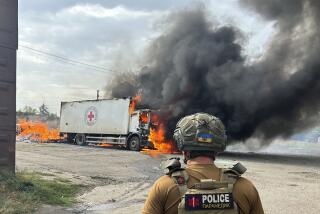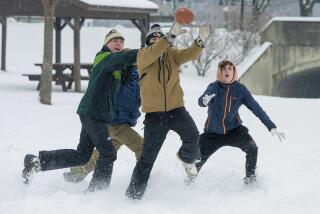As Mercury Hovers Far Below Zero, Russians Are Shivering and Dying
- Share via
MOSCOW — If there’s one thing you would think Russians should be prepared for, it’s cold winters.
But with the thermometer set to plunge once again this weekend to levels far below zero across vast stretches of the country, thousands of apartment buildings, schools and hospitals are suffering from a lack of fuel or ill-maintained heating systems -- sending residents, students and patients into the deep freeze.
The situation is even more dangerous for people caught on the streets. More than 270 people have been killed by the cold so far this season in Moscow alone. The victims, mostly the homeless or the inebriated, stumble, sleep and quietly die -- sometimes as cars and pedestrians pass nearby.
Police expected no relief this weekend. In the early hours today, the temperature was minus 10, with wind that made it feel like minus 25.
With the slogan “Indifference Equals Murder,” a human rights group demanded Friday that Moscow’s mayor open more shelters and take other steps to reduce the daily tally of hypothermia and frostbite victims, which is projected to result in 400 deaths this season in the city of 10 million.
Casualties on such a scale are more appropriate to a military campaign than to winter in a European capital, said Alexei Nikiforov, coordinator of the homeless assistance program of the group Doctors Without Borders.
“There is no war, yet people are still dying,” Nikiforov said.
Doctors Without Borders blames the majority of deaths on “general indifference” in a city that sometimes seems as if it has ice water in its veins.
“Unfortunately, it has become normal to pass by a person who has fallen down or lost his consciousness,” the group said.
But even having shelter has not been enough to spare about 25,000 people in the Karelia and Novgorod regions, north of Moscow, from the frigidity -- because of faulty heating.
“It used to be a proper hospital, and now we call it a refrigerator,” complained Svetlana Kozenkova, the head physician at a hospital outside the city of Veliky Novgorod. Wards are staying barely above the freezing point during this cold stretch because of broken heating lines in the area, about 250 miles northwest of the capital.
“Not only is it impossible to treat the sick in such temperatures,” she added, “it is hard for a healthy adult to survive.”
Lyudmila N. Pyattoev, 54, a nurse who lives with her husband, Vitaly, 55, in a two-room apartment farther to the north, in Karelia, said she doesn’t know how they will endure.
After having had to chip away at a block of frozen chicken stock in order to make her husband’s evening soup, she described herself as being on the verge of a nervous breakdown.
“There is no heating, my apartment does not have running water, the sewers are completely frozen over, some radiators have burst, and there is no gas in the apartment,” she sobbed in a telephone interview from the town of Muyezerka. “And there is no hope that anything will be done to save us until spring.”
She too compared the situation to wartime.
“There must have been things like this during the Great Patriotic War. But back then, it would have been absolutely explicable. What is the reason now? We are lost for answers, and we are lost for words.”
The couple’s two small space heaters run 24 hours a day but keep their home only a little above freezing, Pyattoev said. In the bathroom, the toilet is frozen solid, forcing the pair to use a bucket or else walk to the apartment block where her sister lives, half a mile away.
“Cold brings you physical suffering every second -- it is impossible to get away from it,” she said.
At night, she and Vitaly climb into their cold bed fully clothed, but it doesn’t help much, she said.
“I try to snuggle against my husband to stay warm, and often cry quietly with helplessness. I do not want my husband to see my tears, because I know that he is also cold and having a hard time too, but it is beyond his power to change anything,” she said.
“What a life! It is a nightmare, pure and simple.”
Ruslana Kuptsova, a 33-year-old doctor in Muyezerka, about 600 miles due north of Moscow, said the paradox is that people who live in traditional log houses with wood-burning stoves are faring OK, but those in so-called comfortable dwellings built during Soviet times are freezing. The problems started with an electrical blackout that lasted three hours, enough to stop the pumps and cause the hot-water systems of many houses to freeze.
“Civilized nations cannot even imagine what conditions Russian people live in!” Kuptsova said. “Nothing compares to it.”
It is exactly that kind of anger and frustration that President Vladimir V. Putin had hoped to avoid this year. Even before winter struck, Putin was admonishing governors and local officials to make sure local systems that heat neighborhoods and even entire towns were functioning and that plenty of coal and heating oil had been stored.
In response to the cold snap, Putin met Thursday with Prime Minister Mikhail M.Kasyanov. Together with the Emergency Situations Ministry, they announced the mobilization of a work force of about 1,000 people to deal with broken heating systems. Some military troops also have been called up and added to the effort.
*
Alexei V. Kuznetsov of The Times’ Moscow Bureau contributed to this report.
More to Read
Sign up for Essential California
The most important California stories and recommendations in your inbox every morning.
You may occasionally receive promotional content from the Los Angeles Times.












